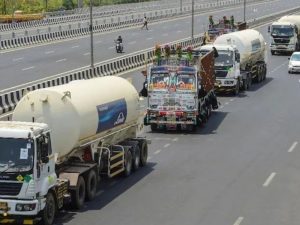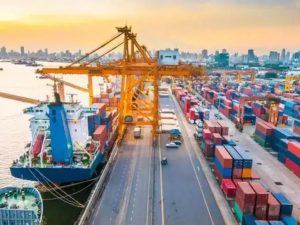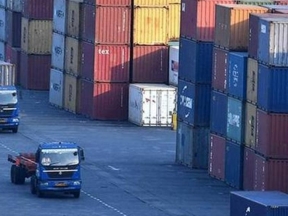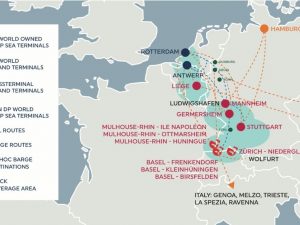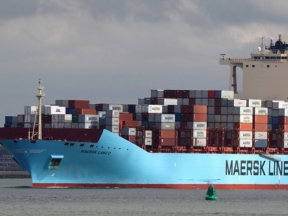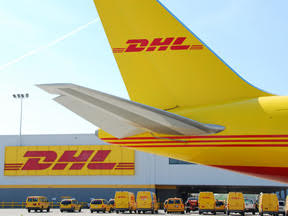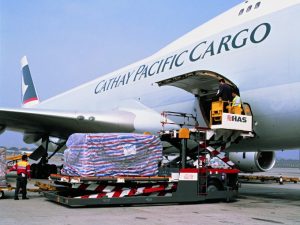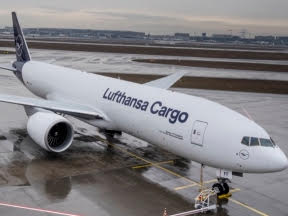During the ongoing Covid-19 pandemic, major focus has been on quick and smooth transportation of Liquid Oxygen (LOX) to various parts of the country. In this regard, it has been brought out by the Ministry of Road Transport & Highways that as per extant rules and in consonance with the CMVR, 1989, ONLY trained drivers with adequate training and having ‘hazardous cargo’ license are allowed to operate the Liquid Oxygen (LOX) trucks. Therefore, there is an urgent need to make available a large pool of trained drivers who can supplement / replace the existing drivers, keeping in mind 24×7 operations. In this context, the Ministry has advised states & Union Territories to create a pool of trained drivers and 500 such trained drivers are to be made available immediately and the number of drivers to be increased to 2500 in the next two months.
Read More »Kolkata Port Trust prepares itself for cyclone Yaas
Syama Prasad Mookerjee Port (SMP), formerly known as Kolkata Port Trust, is monitoring the situation in view of the forecast of a very severe cyclonic storm, Yaas, and taking preparatory measures to avoid loss of human lives, vessels, and other properties, an official said on Saturday. The port authorities asked officials to ensure that all its vessels are taken inside the dock before the onset of the cyclonic storm, and no ships will be kept at river jetties, SMP Chairman Vinit Kumar said. Control rooms at Kolkata Dock System and Haldia Dock Complex have been set up, he said. “We are continuously monitoring the situation and will stop our operations at the right time. Control rooms at KDS and HDC have been manned by senior officers since May 21. Tugboats and launches will be available for any emergency,” Kumar said. A low pressure area formed over east central Bay of Bengal on Saturday, which is likely to intensify into a very severe cyclonic storm and move towards West Bengal, adjoining north Odisha and Bangladesh coasts around May 26 morning, the regional Met Department said.
Read More »Private terminal operators seek revival measures as policy changes clip cargo
A lobby group of India private terminal operators have sought the government’s policy intervention for permitting single cargo handling terminals to handle multi commodities at major ports. Some of the public-private-partnership (PPP) concessions at major ports allow the operators to handle only one commodity such as coal, iron ore etc. The PPP projects are structured whereby the traffic risk is borne by the concessionaire, whereas the concessioning authority secures revenue through minimum guaranteed cargo mechanism. “Of late, there have been significant market disruptions hampering the functioning of these terminals. It is difficult to manage risk due to court orders banning the import/export of cargo, government policies discouraging imports and significant disruptions in market conditions,” the Indian Private Ports and Terminals Association (IPPTA) wrote in a May 9 letter to the ministry of ports, shipping and waterways.
Read More »Transshipment Port & other infra projects planned in Nicobar Islands
The Narendra Modi government’s ambitious plan for a transshipment terminal and other infrastructure projects on the Great Nicobar Island, piloted by the NITI Aayog, has cleared the first major hurdle in its way. After a series of meetings in March and April, the 15-member Environment Appraisal Committee of the Ministry of Environment, Forest and Climate Change, has “recommended the proposal for grant of Terms of Reference.” The plan proposes the construction of a transshipment terminal, a greenfield international airport, township and area development and a 450 megavolt amperes gas and solar based power plant on Great Nicobar, the southernmost and largest of the Nicobar Islands, and India’s southernmost territory. Transshipment involves offloading cargo from one ship and loading it onto another vessel to be carried to the final port of discharge.
Read More »Chittagong Port Authority recommends ICDs to be doubled for making business easy
The Chittagong Port Authority (CPA) has recommended doubling the number of private inland container depots (ICDs) to facilitate the delivery of imported goods from the off-docks and make doing business easy. It urged the stakeholders concerned to invest more in setting up of the private ICDs in the Chittagong port as 20-25 more ICDs are needed to keep the export-import activities uninterrupted. In a recent meeting, stakeholders like exporters, importers, customs officials and representatives from Bangladesh Inland Container Depot Association (BICDA) also agreed with the CPA’s proposal to mitigate congestion in the port. They also urged the port authorities and the National Board of Revenue (NBR) to facilitate the investors, who are willing to set up new ICDs, through providing speedy service.
Read More »DP World adds three European ports to its network
DP World has enhanced its European inland network, adding three ports in the Alsace region through its affiliate company, Swissterminal. Earlier this month, the public authority Syndicat Mixte des Ports du Sud Alsace (SMO) awarded the concession contract of the Ports of Mulhouse-Rhin to the public-private company composed of the SMO, the Caisse des Dépôts et Consignations and Alsaceteam, which is a joint venture of Swissterminal and the two French seaports Grand Port Maritime de Marseille and Haropa Port du Havre. The operation of the three French inland ports is granted through a sub-delegation contract to Alsaceterminal, a wholly owned subsidiary of Swissterminal, according to a statement, which will take over Ottmarsheim, Huningue-Village-Neuf and Ile Napoléon ports in the course of 2021.
Read More »Maersk accelerates transformation to integrated service
AP Moller Maersk said its integrator strategy that will see the company transform into a comprehensive, customer-facing door-to-door logistics service will offer the carrier significantly improved profits. Speaking at Maersk’s Capital Markets Day Maersk CEO Søren Skou told analysts and investors that the company is ready to build three divisions with strong synergies between them, with a customer focus, that will drive value creation through digitalisation. “Today, we are rapidly transforming our A.P. Moller – Maersk in line with our strategy. We have come far, but we are not yet done. We continue to see a significant opportunity in the market for global end-to-end logistics and are confident that we can continue to deliver value generating returns above 7.5%, ROIC, considering the extraordinary earning levels of 2021 an average of above 12% for the five year period 2021-2025,” said Skou.
Read More »DHL issues a white paper revealing the learnings from one year into COVID-19
It has been more than a year since the world woke up to the news of the new SARS-COV-2 virus. With over 200 million doses of all approved vaccines distributed to over 120 countries and 9,000 operated flights in which more than 350 DHL facilities were involved, DHL was part of the response strategy from the beginning. Over 50 bilateral and multilateral collaborations with partners in both the pharma and public sector and several new dedicated services were created to stem this task. “The white paper builds on the experience of providing logistics to manage the pandemic over the last 15 months and vaccine distribution in over 120 countries. I do hope that this will help to shape our plans for pandemic management as well as vaccine distribution in India,” says R.S Subramanian, SVP and Managing Director, DHL Express India. Highlighting the aspects that can boost India’s vaccine roll out drive as well as any future health crisis, Subramanian adds, “Better collaboration, boost for manufacturing capacity, research, production and procurement plans and expansion of local deployment capabilities are needed in the coming months. There is movement in this direction.”
Read More »Cathay Pacific cargo capacity gradually recovers after easing the restrictions
Cathay Pacific’s cargo capacity was only gradually recovering in April after the relaxation of stricter crew quarantine rules in the middle of the month. The Hong Kong-based airline in April saw its cargo capacity in cargo tonne km terms drop by 36.6% compared with February levels as a result of stricter quarantine measures being introduced. These rules were relaxed in mid-April for vaccinated crew, but capacity only gradually came back online. The April figure was was also higher than the 25% drop off in capacity recorded by the carrier in March. Cathay Pacific group chief customer and commercial officer Ronald Lam explained: “While we welcomed the easing of quarantine restrictions for cargo aircrew in Hong Kong in mid-April, the positive impact of the relaxation was not immediately realised due to crew rostering lead time and our overall capacity last month remained significantly affected.” “The number of freighter and cargo-only passenger flights that we operated was lower than at any point since the Covid-19 pandemic began, limiting our ability to provide more lift to what was a reasonably buoyant cargo market, particularly on long-haul routings. This reduction in capacity together with the firm market led to a high load factor of 83%.”
Read More »Lufthansa Cargo join hands with DB Schenker on Sustainable Aviation Fuel (SAF)
The Lufthansa Cargo freighter with the registration D-ALFG took off for the first time with a very special design: the lettering “Flying 100% CO2 neutral powered by DB Schenker” and an illustration of Sustainable Aviation Fuel (SAF) highlight the joint mission of Lufthansa Cargo and DB Schenker. Both companies have been working together on climate protection for ten years and have now been able to launch a concrete offer on the market. “We are delighted to have DB Schenker at our side, a partner who is so energetically promoting the reduction of CO2 in the air freight industry. The special livery gives us the opportunity to draw attention to our joint commitment worldwide. It also shows that we take our support of the United Nations’ ‘Climate Action’ Goal very seriously. The increased use of Sustainable Aviation Fuel and a modern freighter fleet are measures with a great impact to sustainably reduce our CO2 emissions,” explains Ashwin Bhat, Lufthansa Cargo Chief Commercial Officer.
Read More » Cargo Breaking News
Cargo Breaking News
